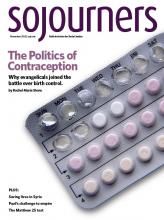EARLIER THIS YEAR Pope Francis titillated the world’s 1.2 billion Roman Catholics when he said we should not feel compelled to breed “like rabbits.” The Twitterverse resounded with commands to “hop to it.” The Italian press dubbed Francis’ speech the “Sermon of the Rabbit.”
In it, Pope Francis said, “Some think that—excuse the language—that in order to be good Catholics, we have to be like rabbits. No. Responsible parenthood.”
Was the pope changing Catholic teaching on birth control? On the contrary, Francis went on to underscore that “responsible parenthood” requires that couples regulate the births of their children, as Vatican teaching allows, using natural family planning methods.
What we think of as “the Catholic position” on contraception—“‘Every action which ... proposes to render procreation impossible’ is intrinsically evil”—was actually codified as official teaching in 1930 under Pope Pius XI and was part of a larger conversation in Christendom. At the 1930 Lambeth Conference, for example, the Anglican bishops approved a resolution stating: “In those cases where there is such a clearly felt moral obligation to limit or avoid parenthood, and where there is a morally sound reason for avoiding complete abstinence, other methods [of contraception] may be used, provided that this is done in the light of the same Christian principles.”
In 1951, Pope Pius XII overtly accepted natural family planning as a moral form of regulating births, in limited circumstances, within Christian marriage. He also emphasized the importance of a mature and informed conscience in moral reasoning. “It is correctly argued,” he wrote, “that the true meaning of adult independence is not to be led like a little child.”
As part of the process around the Second Vatican Council, Pope Paul VI oversaw a commission to examine the use of oral contraceptives in light of church teaching. The commission’s report—titled “Responsible Parenthood”—argued for the use of artificial contraception within Christian marriage. In the end, Pope Paul VI rejected the commission’s recommendation, and his 1968 encyclical Humanae Vitae reaffirmed the church’s teaching against artificial contraception.
Read the Full Article

